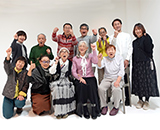
Award summary
According to estimates by the Ministry of Health, Labour and Welfare, approximately 4,710,000 people will have dementia in 2025, and this 5,840,000 will have it in 2040. This is one third of people who are 65 years of age or older. However, dementia is not always an issue only for the elderly. The disease is accompanied by persistent prejudice and misunderstanding even though it is a familiar obstacle in life that anyone can encounter. It is generally believed that people with dementia do not understand anything and they cannot do anything.
Some people with dementia have started to speak around Japan to change society. After communicating and talking with each other many times, they established the Japan Dementia Working Group (JDWG) in 2014. People with dementia have taken the initiative to operate the organization, carrying out activities throughout Japan together with many partners including friends, caregivers, municipal governments, and businesses to realize a society where people can live their lives with hope and dignity even after developing dementia.
Ms. Kazuko Fujita (age 63) is one of the co-leaders of the JDWG foundation and the representative director of the corporation. She was diagnosed with early onset Alzheimer's disease at the age of 45. Luckily, she noticed she was experiencing abnormal memory issues and sought medical advice at a very early stage thanks to her medical experience as a nurse. However, the community and other professionals lacked an understanding of dementia. They avoided her when she would say hi to them, and they stared at her rudely. Their prejudice hurt her deeply. They were not treating her as a person with her own unique character. People can live as they are using their own abilities and being supported by others even after developing dementia. Because of her experiences, she felt strongly that it is necessary to create a society where people do not hesitate to get medical attention when they notice any change in their memory and can tell others about dementia if they develop it. She started activities to enable people with dementia to speak up in her home in Tottori. Her activities connected her to other people carrying out similar activities with the same thinking around Japan.
Their initiatives include policy proposals from the perspective of people with dementia, public awareness activities to increase people's interest in and understanding of dementia as Ambassadors of Hope appointed by national or municipal governments, members of their organization sharing the opinions of people with dementia across Japan through lectures and media appearances in cooperation with municipal offices and trade associations. The members of the organization participate in peer support activities by sharing their experience as people who have lived with dementia for some time with people who have just been diagnosed as having dementia and their family members to talk about creative thinking in everyday life and their positive attitude toward life. People with dementia participate in patient meetings to engage in community planning and exchange opinions about livable communities based on their experience. Additionally, they have recently engaged in co-creation activities by getting involved in companies' product and service development processes. Keeping the purpose of their activities in mind, they identify the things they want to do and the things that are needed and work with regional administrative organizations and friends in the ways that are suitable for each municipality.
The Declaration That People with Dementia Will Live in Hope is one of the great achievements of the JDWG. It is a declaration that people with dementia will live in hope. The members of the organization who have dementia across the country worked together to develop it, sharing opinions and discussing issues many times. They announced the declaration during a press conference at the Ministry of Health, Labour and Welfare in 2018. The declaration was incorporated in the Basic Act on Dementia to Promote an Inclusive Society enacted in 2024. The act emphasizes a perspective of coexistence, putting fundamental human rights at the top of people's principles. This means that a social foundation is being gradually prepared so that people can live with dignity regardless of whether they have dementia.
They have taken a stand and continually displayed their positive attitude toward life as people with dementia. This has helped society as a whole begin to gradually change its view of dementia. The JDWG continues to broaden the range of its activities to enable people to hope, aiming to help establish a society where people can live as they are without anxiety, regardless of who they are or where they live.
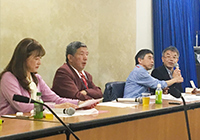 The hopeful declaration about living with dementia was announced during a press conference held at the Ministry of Health, Labour and Welfare in 2018
The hopeful declaration about living with dementia was announced during a press conference held at the Ministry of Health, Labour and Welfare in 2018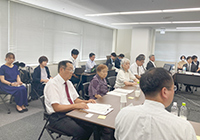 He gives policy recommendations and lectures from his own perspective and spreads the message that you can live with hope and dignity even if you are suffering from dementia.
He gives policy recommendations and lectures from his own perspective and spreads the message that you can live with hope and dignity even if you are suffering from dementia.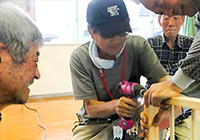 Despite having dementia, he keeps pursuing his unique lifestyle and the things he is good at, and promotes this attitude with his local friends.
Despite having dementia, he keeps pursuing his unique lifestyle and the things he is good at, and promotes this attitude with his local friends.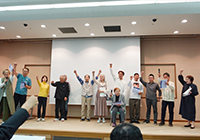 Since he has spoken up and consistently shown a positive attitude, he is changing the long-established views on dementia.
Since he has spoken up and consistently shown a positive attitude, he is changing the long-established views on dementia.Reasons for this award
Most notably, people with dementia themselves speak up and act independently. This moved us. Their message that dementia is not a stigma and that there is no need to be afraid enables people with dementia and their family members to hope. Notably, their strong will to eliminate prejudice against people with dementia and change society has achieved results, such as the creation of the Basic Act on Dementia to Promote an Inclusive Society. Their activities are precious and worthy of respect because they can only be done by people with dementia. We believe their activities will be more and more important in the future.
Comments from the winner
Ten years have passed since I started working with my friends who endorsed my thinking regarding the establishment of a society where people can live with hope and dignity even after developing dementia. There is something we can do for society and the people who come after us because we have developed dementia a little earlier. We greatly appreciate this award. Winning the award has given us the courage to keep moving forward. We will continue to take on the challenge of expanding the relay of hope so that more people can live their own lives with full hearts, regardless of their age, even after developing dementia and expand the circle of people aiming to create a better society together.






